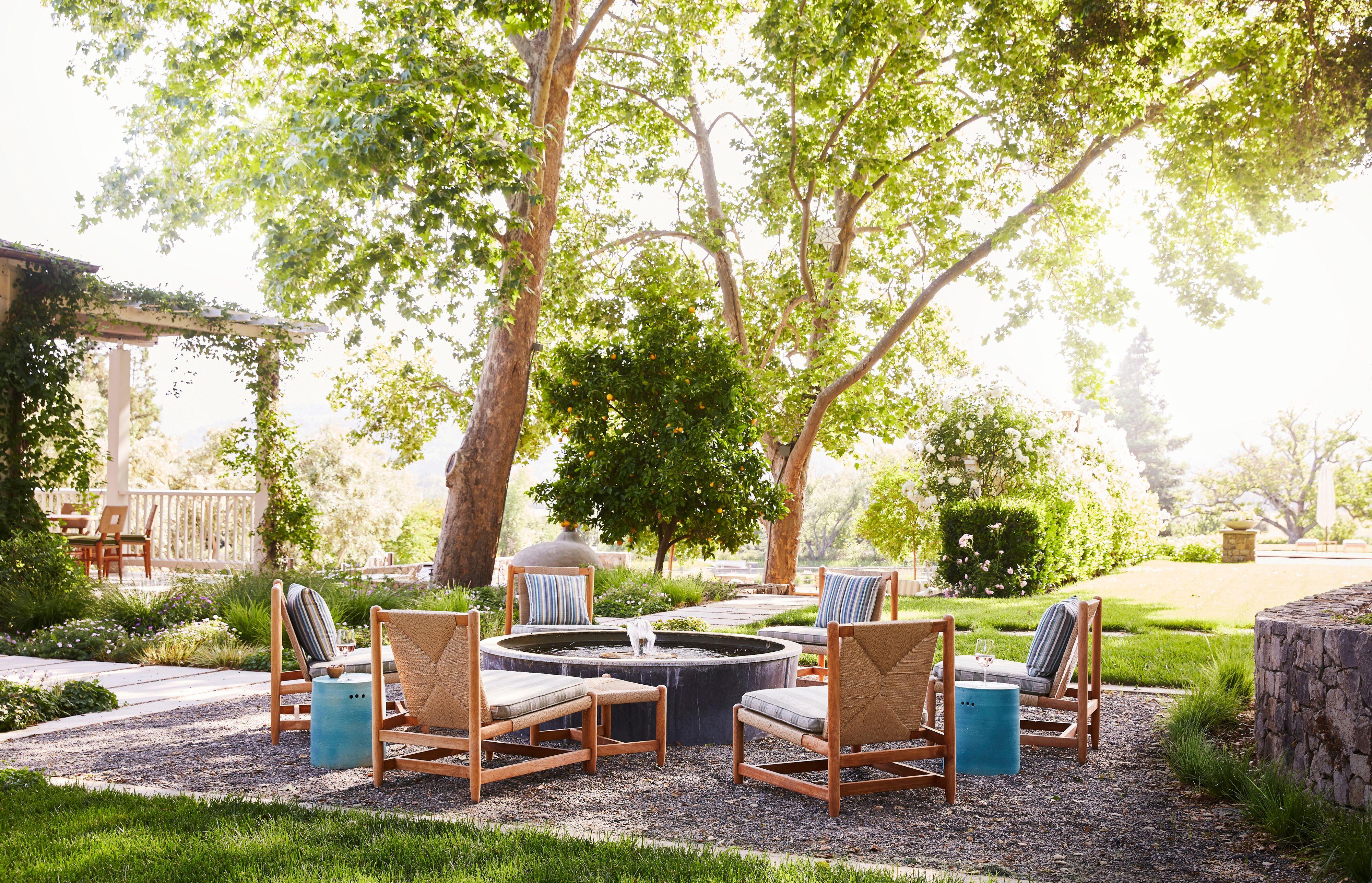If you haven’t heard of the term sparden or spa-den yet, this combination of “spa” and “garden” is all about turning your backyard into a relaxing retreat. Water features are a key component thanks to their tranquil sound and rhythmic flow.
More and more, designers are being asked to install fountains, rather than firepits, as a place to gather and unwind, and we’ve fallen hard for these tranquil seating areas. Not only do the gentle sounds and rippling reflections of moving water offer a cooler take on the firepit, they're also a savvy alternative in regions where firepits may pose a hazard.
How to Incorporate a Garden Fountain
Interior designer Peter Dunham arranged low-slung furniture around a basin-style fountain installed by landscape designer Scott Lewis at a Napa, CA, home, where a neat gravel square, a stone wall, and a tree canopy help define the space as an outdoor room. Here's how to set up your own water feature seating area so that it becomes a restful spot for outdoor gatherings.
Peter Dunham, interior designer
“A fountain creates an architectural element, and the sound gives a psychological sense of peace. It’s a very refreshing element [in the garden].”
— Peter Dunham, interior designer
Lisa Romerein / Landscape Designer: Scott Shrader
Seek Harmony
Your fountain’s design should coordinate with and complement its surroundings. For example, landscape designer Scott Shrader chose a classic blue urn to fit in with a home’s Spanish-style architecture and add a note of color amid the landscape’s narrow palette. A low-slung stone bench serves as a place for quiet contemplation and echoes the tone of the pea gravel.
Likewise, the pale wood of the chairs Dunham designed relates to the bark of a nearby sycamore. "The teak and rush elements felt very rustic, and the house is partly a farm, so it gives it this natural vibe," he says. Dunham also pulled in turquoise accents with ceramic garden stools. "You can move them around easily, but they also don't topple over easily. You can sit on them or use them as little side tables," he notes.
Dial in the Volume
“Fountains add an element to a garden like no other, but you’ve got to get the sound perfect,” says landscape designer Kennedy McRae, cofounder of Earth Inc. Look for styles with adjustable flow control so you can tweak the strength of trickling water. “You want it gentle enough that it sounds like a babbling brook,” he says.
This is especially important the closer your seating area is. For a noisy downspout-style fountain, McRae suggests putting a screen over the water to break up the stream. "It dissipates the water," he says, "so when it hits the actual reservoir, it's a little bit more like a shower."
Brenda Liu / Landscape Designer: Earth Inc
Consider Depth
If you hope to attract birds, pick a shallow fountain like the custom waterfall style by McRae. “It’s about an inch deep [at the surface]. At that depth, birds will actually land on it and use it as a bird bath,” he says. Try adding river stones to the bottom of a deep basin to adjust the water level in a naturalistic way.
Most garden fountains recirculate water, so they don’t need plumbing, but they do need topping up as water evaporates. You can also turn any bird bath into a fountain by floating a solar-powered water pump in the basin.
Related
Blend It In
To evoke a naturalistic look, McRae suggests planting up close to the fountain. “We always try to get plantings spilling around [a water feature] to soften it,” he says. This can be especially useful in smaller urban settings or heavily hardscaped areas where you want to create the feeling of an oasis.
"Pick the plant for the kind of setting you're trying to evoke," advises Rae, noting that ornamental grasses planted near a fountain can mimic reeds around a pond while large leafy plants can create a tropical vibe. Or if you have the space for it, follow Lewis's lead and place a fountain near a tree—or plant one nearby. Surrounded by plants, a fountain seating area will feel more connected to the garden and your senses.



